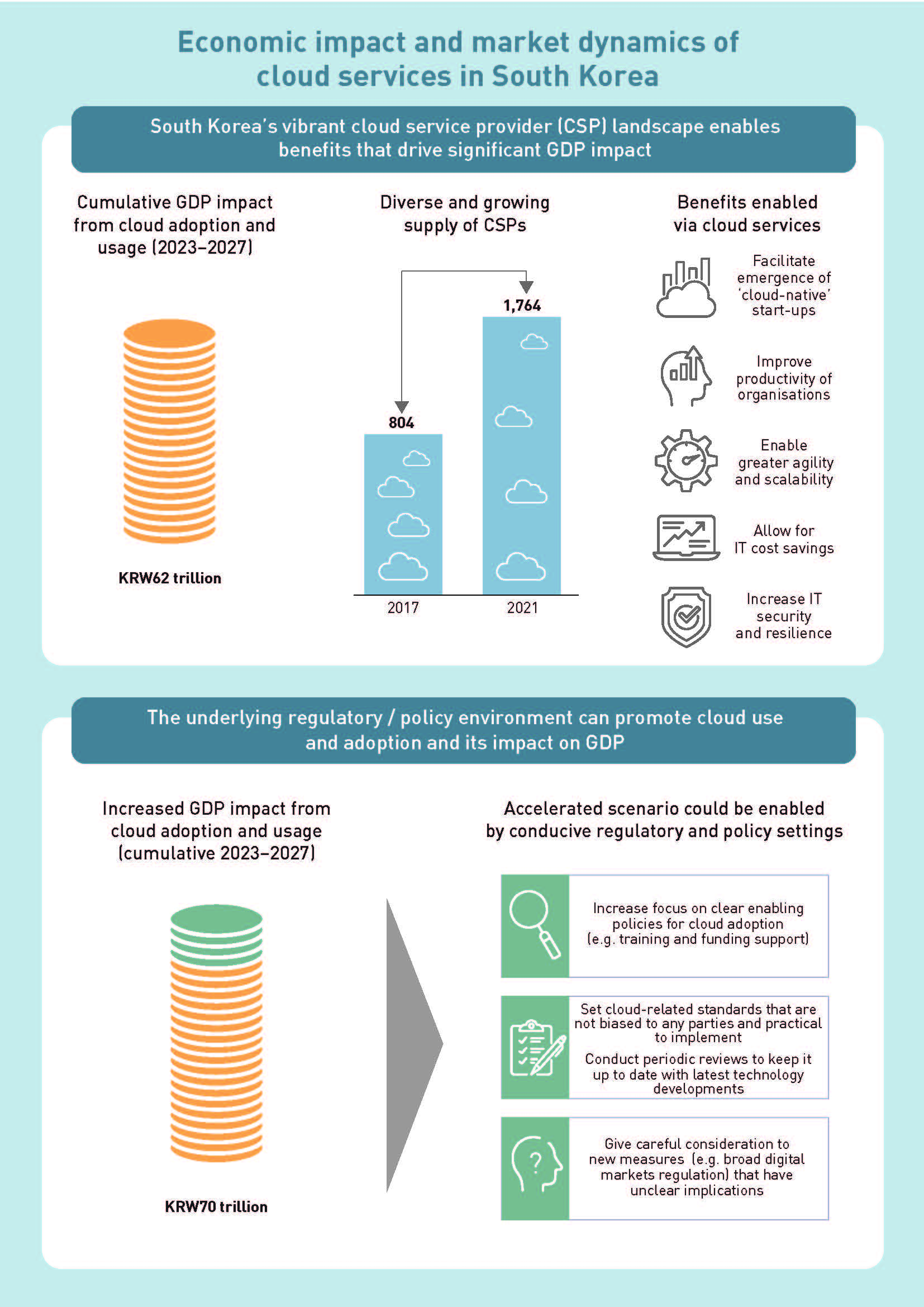Economic impact and dynamics of cloud services in South Korea
25 July 2023 | Regulation and policy
Jay Lee | Michael Kende | Dion Teo | David Abecassis
Report | PDF
This report reviews the dynamics in South Korea’s cloud services sector from both a demand and supply perspective, assesses the economic impact of cloud services in South Korea, and discusses regulatory considerations in light of the key findings.
South Korea is well placed to derive strong benefit from cloud services – it is one of the most digitally advanced economies in the world, with high-quality internet access and a relatively high capacity to adopt digital technologies. However, it still lags behind many other advanced economies in cloud adoption. This is partly due to cultural and structural aspects of South Korea’s economy (e.g. local conglomerates), but regulatory factors that have constrained the externalisation of IT functions and the adoption of cloud services also play a role. In addition, improving cloud-related workforce skills and addressing security concerns are areas that can enable South Korea to further capitalise upon the benefits brought by cloud services.
South Korea’s cloud services sector is remarkably diverse. A large number of Korean cloud service providers (CSPs), including Naver Cloud, KT Cloud, NHN, Douzone Bizon and Kakao, offer a broad range of innovative services to organisations of all sizes. In parallel, international CSPs including AWS, Google Cloud, Microsoft Azure and Alibaba Cloud, as well as smaller players such as Cloudflare and Snowflake, are also actively servicing commercial enterprises in South Korea. The vibrancy of the South Korean cloud services sector is reflected in sustained growth in the number of CSPs operating in South Korea, which grew from 804 in 2017 to 1764 in 2021. The country has also seen a high degree of multi-cloud take-up, with an adoption rate of 2.5 public clouds per enterprise.
In our central projection, the supply landscape continues to be robust, demand increases at a similar trajectory to past growth and the current regulatory environment remains largely unchanged. In this context, we expect annual cloud spend to grow to KRW10.9 trillion in 2027, with an estimated cumulative contribution to South Korea’s GDP of KRW62.2 trillion in the 2023–27 period.
A more supportive regulatory and policy environment could unlock faster adoption of cloud services and lead to a greater economic impact. Further government actions are needed to achieve this, and could include funding for digital initiative training and subsidy programmes, as well as periodic reviews of laws and regulatory measures to ensure they reflect and support government policy developments. Regular reviews of the Cloud Security Assurance Program regulation and national core technologies regulation, for instance, could ensure that cloud customers have access to the widest possible range of solutions within clearly defined security and resilience standards, which could lower barriers to cloud adoption and increase the resulting economic impact.
Conversely, imposing regulatory measures that target specific CSPs or certain cloud services have the potential to adversely impact technological and digital developments in the cloud services sector. For example, regulation that imposes new onerous obligations on CSPs could reduce the IT choices available for businesses and government agencies and/or innovation and investment in new services in this sector. Such interventions must thus be carefully tested and calibrated to avoid poor outcomes that would ultimately reduce the economic potential of cloud services for South Korea overall.
Illustratively, if cloud adoption accelerated over the next five years so that annual cloud spend reached KRW13.9 trillion in 2027, instead of our base case of KRW10.9 trillion, the corresponding multiplier effect could potentially result in a cumulative GDP increase of KRW8.3 trillion from 2023 to 2027. Understanding the benefits that cloud adoption can bring to commercial enterprises and government agencies and how this positively impacts the overall South Korean economy is crucial – only a policy and regulatory environment that facilitates the growth of cloud services in South Korea will achieve the cumulative GDP increase observed above. The South Korea government thus needs to carefully consider, assess and determine the impact of policies that may affect cloud adoption through a careful analysis of their costs and benefits.

Source: Analysys Mason
Author

Jay Lee
Principal
Michael Kende
Senior Adviser
Dion Teo
Partner, expert in strategy

